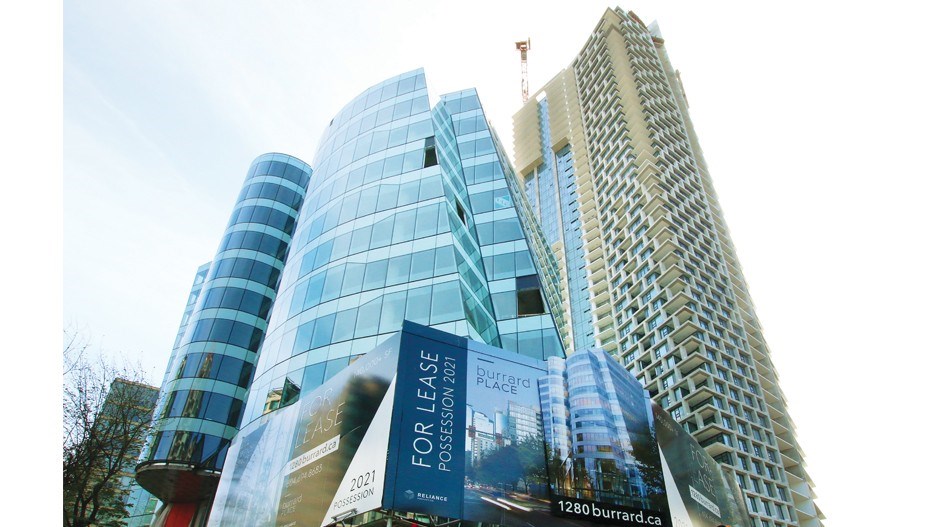A spigot can be plugged in an instant. A pandemic, one that’s left many Vancouver office towers sitting as mostly empty husks awaiting the return of workers, doesn’t work that way.
“The challenge with COVID is it’s not a tap that’s just going to turn off,” said Colin Scarlett, an executive vice-president with Colliers International Canada. “It’s not like people are going to wake up after Labour Day and suddenly everybody’s back downtown. It will be a slow progression back.”
Amid surging COVID-19 cases, the province delayed the final stage of its reopening plans last month that would have potentially seen offices returning to normal capacity (should they wish) by Labour Day.
But for Scarlett, that hasn’t translated into less demand for office space in Vancouver’s downtown.
“I’m busier than ever in my 25-year career,” he told BIV.
It might sound counterintuitive, but Scarlett said businesses are now planning for two to four years down the line rather than assuming the Delta variant will keep workers at bay indefinitely.
The high demand – 62% of which is coming from the region’s tech sector, according to Collier’s internal data – is mainly coming from larger employers, while smaller operations requiring space for fewer than 30 people have been more hesitant to secure leases.
“People finally have just decided, ‘You know what? We just can’t operate our business like this. We have to start thinking for the long term.’ And some of this demand is pent-up demand but a lot of it is new,” said Scarlett.
“There’s also been some huge winners [during the pandemic] in content creation, and life sciences … And those winners are reinvesting back into people and into space.”
Just over the summer, biotech companies such as AbCellera Biologics Inc. (Nasdaq:ABCL), and entertainment companies such as Double Negative Ltd. and Walt Disney Co. (NYSE:DIS) have all announced expansion plans within Vancouver.
Despite the long-term bet that big businesses are putting on the revival of the city’s downtown, the immediate outlook isn’t pretty.
Avison Young Inc. launched a “vitality index” earlier this month, tracking North America’s biggest urban centres in a bid to measure the pace of return to downtown.
Foot traffic in Vancouver is down 67.5% as of September 6, 2021, from the start of the index’s measurements on March 2, 2020. The index uses anonymized cellphone location data to measure foot traffic based on city as well as industry.
Despite that steep drop from more than a year ago, Vancouver has had the fifth-lowest drop in foot traffic among cities measured. Boston’s 55.2% drop is the lowest, while Calgary registered the second-lowest drop at 57.9%. Ottawa has experienced the steepest decline in North America at 89.5%.
“Our findings are consistent with on-the-ground workplace trends in Vancouver. Indeed, many Vancouver employees have returned to the office more frequently than other markets,” Sheila Botting, president of Avison Young’s Americas professional services, told BIV in an email.
“[Employers] want a balance of both remote and in-office work environments and will ultimately calibrate their work location based on their schedules. I expect the role of the workplace will continue to evolve as employers seek to entice employees back to the office with collaborative and teaming areas that foster engagement in the work experience.”
The return to downtown has also varied significantly depending on the sector.
Downtown foot traffic related to workers in industries such as consumer durables (-97.1%) logistics (-91.7%) and transportation (-91.4%) have fallen significantly across North America, according to Avison Young’s index.
Downtown visits related to industries such as household and consumer products (-35.3%), and life sciences (-41.4%) haven’t been pummelled nearly as much.
Keira Roets, a senior human resources manager at Vancouver-based Beacon HR Inc., said the delay to B.C.’s reopening plan has already derailed many company’s plans for recalling workers to the office this month.
“Most organizations that I have spoken with over the past few months are remaining flexible with their approach to returning to the office,” she said.
“They don’t want to alienate anyone who wants to return and anyone who wants to stay remote to avoid the “great resignation.’”
Roets said if they are planning to return at some point they are looking at more of a “hot-desk” approach that would allow multiple workers to use a single workstation at different times.
“If you look at a lot of employers, a lot of businesses, they’ve had massive cultural challenges over the last 18 months. And I think people have realized that office space is a facilitator, it’s an enabler of culture,” Scarlett said.
“You can’t schedule a Zoom meeting to innovate.” •




